The President’s Message: October
October 08, 2025 Compiled by Lou Cortina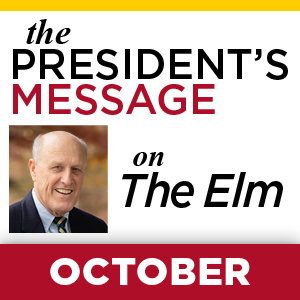
Read Dr. Jarrell’s column on how UMB is showing resilience amid uncertainty and learn about student, faculty, and staff achievements; news from around the University; and upcoming events.
To see previous editions of The President’s Message newsletter, go to the archives page on the Office of the President website.
President’s Column
A SURGEON’S PERSPECTIVE ON NAVIGATING UNCERTAINTY
Over the past four years, the Faculty Convocation has become one of my favorite traditions here at the University of Maryland, Baltimore (UMB). It is more than a gathering of faculty, staff, and students. It’s also a celebration of our academic excellence, our core values, and our shared commitment to improve the human condition and serve the public good. During this year’s Convocation on Sept. 11, I shared a personal story that I’ve reflected on quite a bit over the past few months. While it’s a story from my days in the operating room many years ago, I’ve found that there are many parallels between my experiences then and the challenges we’re facing today across higher education and scientific research.
One day, Maria, an 18-year-old woman from Mexico, came to see me about a difficult medical situation. Maria was born with a rare liver disease that caused her to have intermittent, massive GI bleeds. Each episode was life-threatening. She came to see me because I was chair of surgery at the University of Arizona at the time and I knew about her disease.
She had seen a lot of doctors, and I was her last option.
You see, Maria came from a poor family in Mexico. She had no way to pay to have her surgery done in Arizona. And there was no one in her native city, Hermosillo, who was experienced with the procedure.
I knew the surgery well, and I immediately wanted to help her — it’s what we do. But I would have to do the surgery in Hermosillo, 250 miles south of the U.S. border.
A colleague knew Hermosillo well and was able to arrange an operating room in the large general hospital there. When the time came, I got my team together. We gathered the special instruments necessary to do the procedure, and we drove for five long hours through the Sonoran Desert. When we finally arrived, it was 105 degrees and sticky.
The next morning, we got to work.
The procedure involves finding two very fragile veins deep in the abdomen, clamping them and sewing them together. After these very delicate veins have been sewn together, you take the clamps off, fix the expected bleeding from the suture line, and that’s it. You’re finished. Easy enough, right?
We were an experienced team, and we had prepared. We found the hard-to-find veins after several hours. We sewed them together. It went well.
And then as we removed the clamps — BOOM! The lights went out.
Hermosillo had a power failure. It was pitch-black in the operating room. Remember, after the clamps are removed, the next step in the operation is to fix the bleeding at the suture line — something you can’t do in darkness. In those moments, all I could hear was the sound of Maria being ventilated by hand by the anesthesiologist, keeping her alive, and the ticking of the clock on the wall.
This was the worst possible situation at the worst possible time. But you probably know the feeling when, suddenly, you are faced with some impossible situation — something critical that didn’t go as planned.
That’s what the last six months have felt like to me.
Look at what is happening around us: New NIH grants simply aren’t being awarded, others are being canceled. The rule of law is being challenged. Student support systems, like financial aid and international student visas, have come under fire. Patient services and health insurance programs — like Medicaid — are being cut. States are facing budget cuts. And it’s all happening at the same time.
Each of these recent changes limits our capacity to achieve our mission to improve the human condition. When you combine them at once, where does all this lead?
It feels like the lights have gone out. It feels like I am back in that operating room in Hermosillo, in the dark at a critical time, not knowing where important things stand and unable to find out until the light returns …
Trusting the Team
So, what happened next in Hermosillo? Well, when the power went out, my instincts kicked in. I asked myself, “What are my priorities?” Keep Maria alive.
My first priority was addressing any bleeding. The clamps had already come off. In the dark, I had to guess where the suture line was, put my finger there and hold gentle pressure, hoping to stop any bleeding without harming the delicate veins.
My second priority was Maria’s vitals. I had to place trust in her anesthesiologist — trust that he would maintain her vital signs and keep ventilating her by hand.
My third priority was the team around me: I had to trust my team members to do their jobs, rely on their experience, and focus on what they could control. I had to trust that they wouldn’t panic. And please, someone: Find me a flashlight, quick!
Times like what we faced in that operating room force you to stop and think — to take stock of the situation.
How did this happen to Maria, in the bloom of her life? Her life was now in danger — all because of a power failure.
Am I causing harm? I can’t see where my finger is — am I slowing the bleeding or making things worse?
Why didn’t I foresee the possibility of a power failure? I was accustomed to an operating room working one, specific way. I should have planned for other possibilities and developed contingencies.
Still, the darkness continued, and the clock kept ticking.
Seeking Advice
The past six months have also forced me to take stock — to ask questions similar to those I asked that day in Hermosillo. Questions like: How did we get to this place? At UMB, maybe we feel we are in the dark for some things, but we’re not for everything. After all, I look around and I see all of you: focused on the tasks at hand, hard at work. It’s what you always do. You’re controlling the controllable. And you’re not being distracted by the noise in the background.
We all see higher education being challenged by executive orders, frozen funds, court decisions. How do we respond to these challenges? What is best for UMB? How do we act responsibly?
Where does a president turn to get advice to tackle some of these questions?
Well, I certainly turn to our vice presidents and deans. Every UMB dean and vice president has had to deal with challenges — and has risen to the occasion.
I also turn to an advisory group that we stood up in January of this year. Our Issues Management Advisory Group (IMAG) is made up of about 70 experienced experts across the University. They have kept us current on everything from the biggest issues — like new federal policies and orders — to the smallest of issues affecting just one or two students. They are all important.
Our IMAG members have advised the University well, and their advice has been priceless.
But I have also turned to all of you: our faculty, our Faculty and Staff Senates, our postdocs, our students, our staff, and our leaders. Provost Roger Ward and I have met with over 150 of you from across all seven schools here at UMB. I asked each person to put on my president’s hat for a moment and tell me what to prioritize: What does UMB need the most?
I heard a lot about education, the rule of law, health care, and social justice. And there were stories of personal hardships.
One story, in particular, was very meaningful to me. A junior faculty member had just recently chosen to come to UMB because it is a premier university in his field. He has a family, a mortgage, and a dog. Now, he’s wondering if he has a future in Maryland, let alone a career in science. He wanted to know how we were going to protect early-career faculty.
This is a very important question: Faculty members like him are our future, our seed corn. He can hear the clock ticking. What’s our plan?
Hope for the Future
Back in the operating room in Hermosillo, 10 minutes had passed. Suddenly, a small flashlight appeared, and I had light again. Eureka! I could see the veins, and they hadn’t been injured. There was no bleeding. The surgical field was dry. I had guessed correctly with my finger, and I had applied just enough pressure in just the right spot. I had avoided a catastrophe.
I took a deep breath.
Then, with that tiny flashlight, I closed the surgery.
Maria bounced back quickly. The next morning was a new day for her, and she went home with her family later in the day — a testament to her youth as well as to a successful surgery.
Five years after the surgery, I saw Maria again. She was thriving and she had no further GI bleeding. She was a new person. She had hope for the future.
What I see here at UMB gives me hope for the future, too.
Classes are full. Clinical services in medicine, dentistry, pharmacy, and nursing are robust. Our law and social work programs remain impactful. The University of Maryland Medical Center and the University of Maryland Medical System are in sync with us. Research and scholarly productivity are alive, in spite of the many uncertainties at the federal level.
We are going about our work, regardless of the uncertainty that surrounds us all. We have the right team — we’re made of the right stuff.
And we are doing things that matter — things that matter like life and health, the law, and social well-being. Things like serving as an anchor institution and remaining committed to community service.
They all matter.
But just as Maria needed me to be disciplined and to establish clear priorities, we must do the same for UMB.
My ask of you is this: Keep your finger on what’s critical to success at your local level. Focus on the things that you directly control. Be a trusted member of your team and do your part to keep UMB healthy as well. And don’t get distracted by rhetoric and external influences.
While we are in this period of uncertainty, make sure you take stock of yourself and your university. Ask yourself questions about what we can do better, such as for protecting early-career faculty, improving graduate and professional education, and making research programs more robust. In the current environment, we can still improve.
Staying Focused on Our Mission
And remember that this is the greatest country in the world. Yes, I really do believe this. And yes, some policies are confusing at times. Sometimes there are conflicting messages or court decisions. But this is our country.
We cannot let the people of our country forget that it is universities like ours that help make our country great. Universities that educate professional and graduate students. Universities that are home to experts in biomedical sciences, social sciences, and in the understanding of the law — for without the rule of law, democracy dies. We must remain focused on our mission and share our story, every day.
The lights will come back on.
In the meanwhile, use your expertise, your intuition, and your dedication to serve all of UMB and the people of Maryland.
And, of course, continue to “apply gentle pressure” in just the right places.
You already know how to do these things. The improvements we make now will serve us well when the lights come back on. We will emerge all the stronger.
Sincerely,
Bruce E. Jarrell, MD, FACS
President

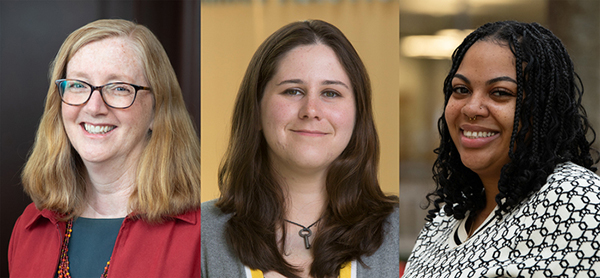 Laurels is a roundup of student, faculty, and staff achievements that is published 11 times a year in The President’s Message newsletter. This month’s edition includes kudos for (in photo, from left) Maureen Sweeney, Francis King Carey School of Law, who co-authored the book “Crimmigration in a Nutshell”; Kimberly Claeys, School of Pharmacy, who received the Maryland Society of Health-System Pharmacy’s 2025 Excellence Award; and Nataki Drones, School of Nursing, who was named UMB’s Employee of the Month of August.
Laurels is a roundup of student, faculty, and staff achievements that is published 11 times a year in The President’s Message newsletter. This month’s edition includes kudos for (in photo, from left) Maureen Sweeney, Francis King Carey School of Law, who co-authored the book “Crimmigration in a Nutshell”; Kimberly Claeys, School of Pharmacy, who received the Maryland Society of Health-System Pharmacy’s 2025 Excellence Award; and Nataki Drones, School of Nursing, who was named UMB’s Employee of the Month of August.
DOWNLOAD LAURELS FOR OCTOBER 2025
New Hires
See a LIST OF NEW HIRES at UMB central administration and our seven schools for September.
News and Notes
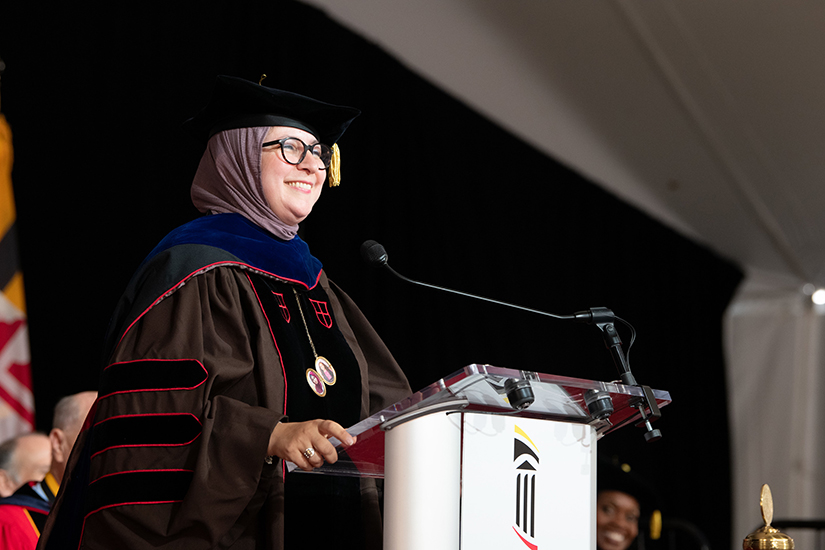
School of Pharmacy associate professor Danya Mazen Qato delivers her speech, “On the Imperative of Courage,” during UMB’s Faculty Convocation on Sept. 11. (Photo by Matthew D’Agostino)
DUTY, SERVICE, AND COURAGE ARE AMONG THE THEMES AT FACULTY CONVOCATION
UMB held its fourth annual Faculty Convocation on Sept. 11, featuring speeches from three faculty members and recognition of the 2025 Distinguished University Professors. Jacqueline Mitchell of the School of Nursing spoke about what inspired her to seek a career in nursing and join the Army; Danya Mazen Qato of the School of Pharmacy discussed having the courage to speak up and challenge assumptions of other researchers’ work even when it might be difficult to do so; and Maxwell Stearns of the Francis King Carey School of Law talked about the state of democracy in the United States and how to potentially repair it. The 2025 Distinguished University Professors honored were: Richard Barth, School of Social Work; Mark Graber, Maryland Carey Law; Myron Levine, School of Medicine (UMSOM); Jay Magaziner, UMSOM; Amal Mattu, UMSOM; and Paula Monopoli, Maryland Carey Law. Former UMSOM Dean E. Albert Reece, a 2024 Distinguished University Professor, also was recognized at the event after being unable to attend last year’s Convocation. (See a video recap of the Convocation below.)
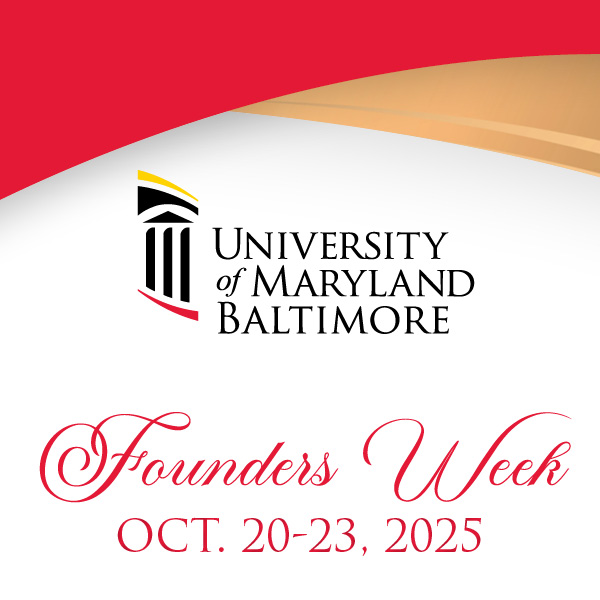 FOUNDERS WEEK AWARD WINNERS AND EVENTS
FOUNDERS WEEK AWARD WINNERS AND EVENTS
Each fall, UMB dedicates one week to commemorate our rich history and celebrate the future we’re building together. Among the highlights of Founders Week is recognizing the work of our faculty, staff, and students with awards that signify outstanding accomplishment in education, public service, research, entrepreneurship, and academics. The 2025 award winners are Andrea Morgan, School of Dentistry, Educator of the Year; Kyla Liggett-Creel, UMB, Public Servant of the Year; Kirsten Lyke, School of Medicine (UMSOM), Researcher of the Year; Rajabrata Sarkar, UMSOM, David J. Ramsay Entrepreneur of the Year; and Danielle Basdekis, Francis King Carey School of Law, Student of the Year. The Founders Week (Oct. 20-23) events include the Staff Luncheon, Student Cookout, Historical Treasures Tour, and Awards Recognition and Reception (invitation only).
FIRST COHORT OF MPOWER PROFESSORS MAKES AN IMPACT
Improving drug safety. Tracking the transmission of airborne diseases. Mapping neighborhood health risks. Research in these three areas and five more in medicine and public health has made important strides through a program supported by UMB and the University of Maryland, College Park. The MPower Professorship was launched in 2021 to recognize, incentivize, and support collaboration among faculty at the two institutions. The inaugural cohort included eight faculty — four from each university — who each received $150,000 over three years to address some of the nation’s most pressing challenges, ones that demand the combined strengths of both universities. UMB President Bruce Jarrell and UMCP President Darryll Pines have championed the professorship, one of several initiatives advanced through the University of Maryland Strategic Partnership: MPowering the State, as a powerful example of how collaborations across campuses can drive innovation and impact.
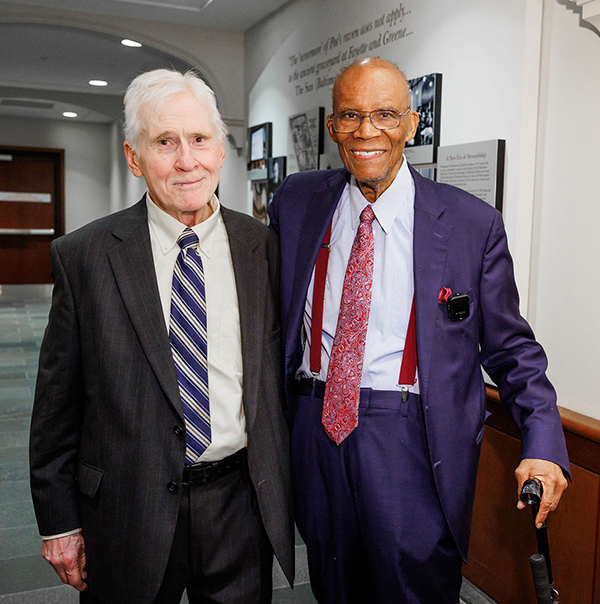 TWO ‘LEGAL GIANTS’ LEAVE LASTING LEGACY
TWO ‘LEGAL GIANTS’ LEAVE LASTING LEGACY
Larry Gibson and Michael Millemann, both Francis King Carey School of Law faculty members since the early 1970s, retired in July, leaving a lasting impact on the law school, city of Baltimore, and state of Maryland. Two of the longest-serving professors in the history of Maryland Carey Law, Gibson and Millemann were instrumental in building the school’s distinctive character and modern purpose. “These legal giants are foundational figures in the identity of our law school, indelibly woven into the story of who we are and what we stand for as an institution,” said Maryland Carey Law Dean Renée Hutchins Laurent, JD. “Their legacies will continue to inspire us as we boldly lead into the future.”
(Photo: Michael Milleman, left, and Larry Gibson)
EMBRACE INITIATIVE: WHEN COMMUNITIES LEAD, CHANGE FOLLOWS
At UMB, the EMBRACE Initiative is reimagining what it means for an anchor institution to work in true partnership with its neighbors. Rooted in the principles of the Rev. Dr. Martin Luther King Jr.’s vision of a Beloved Community, EMBRACE works hand in hand with those most impacted by systemic inequities — youth, returning citizens, and individuals with lived experience — to lead change in areas too often defined by harm. Dr. King described the Beloved Community as a society based on justice, equal opportunity, and love of one’s fellow human beings. In such a community, poverty, hunger, and homelessness would not be tolerated; racism and discrimination would be replaced by an all-inclusive spirit of human solidarity; and conflicts would be resolved peacefully through reconciliation and understanding. EMBRACE seeks to make this vision a reality, embedding it in every program and partnership.
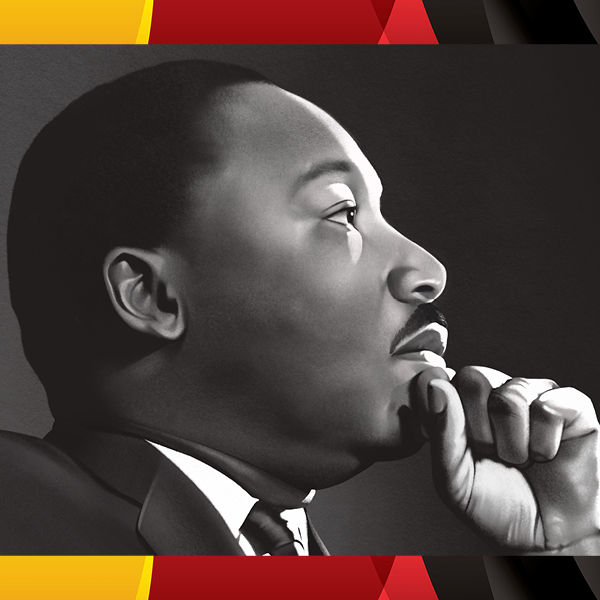 NOMINATE A COMMUNITY CHAMPION OF JUSTICE
NOMINATE A COMMUNITY CHAMPION OF JUSTICE
As part of UMB’s annual Rev. Dr. Martin Luther King Jr./Black History Month Celebration, the Office of Equity, Diversity, and Inclusion and the Office of Community and Civic Engagement are accepting submissions for the Community Champion of Equity and Justice Awards. These awards acknowledge a person and an organization advancing equity and justice in the city of Baltimore. Nominations are due by the close of business Oct. 31.
MARYLAND CHARITY CAMPAIGN
The 2025 Maryland Charity Campaign (MCC), a workplace charitable giving program, offers state employees the opportunity to contribute to charities that are meaningful to them through payroll deduction or a one-time credit card gift. This year’s MCC theme is “Giving Back Together.” UMB employees and retirees who give through the MCC offer hope for charities as well as those that depend on their services. By donating to causes you love through this campaign, you not only support charities that matter to you personally, you also strengthen the sector, your community, and the world at large.
Upcoming Events
CAMPUS SUSTAINABILITY MONTH
October is recognized nationally as Campus Sustainability Month. This month, the UMB Office of Sustainability is hosting events and initiatives across campus to celebrate sustainability, and the office welcomes all members of the UMB community to participate.
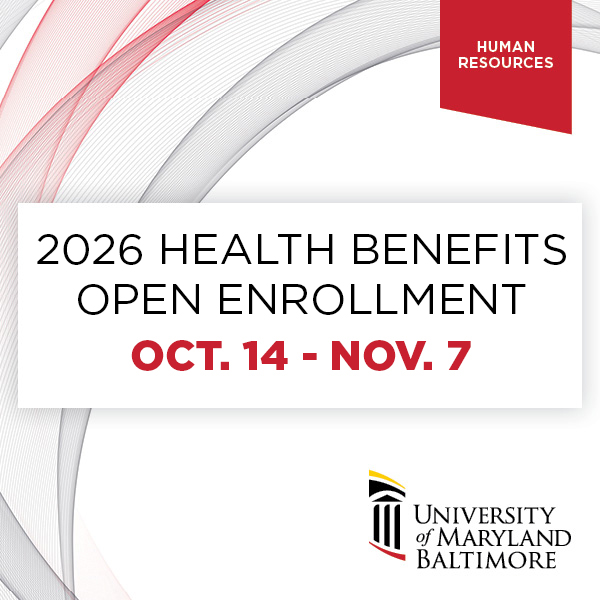 OCT. 14: 2026 OPEN ENROLLMENT BEGINS
OCT. 14: 2026 OPEN ENROLLMENT BEGINS
You must take action if you want to change plans, change coverage levels, enroll for the first time, or participate in or continue participation in a health care or dependent care flexible spending account. Open enrollment runs through Nov. 7 at 5 p.m.
OCT. 20-24: WILLS (AND MORE) WEEK
Estate planning is more than having a will. From getting an early start on your financial plan to naming someone you trust for health care and financial decisions — plus ways to create a legacy for the people and causes you care about — this free series during National Estate Planning Awareness Week covers the essentials and beyond.
OCT. 30: UMB BUDGET TOWN HALL
Dawn Rhodes, chief business and finance officer and senior vice president, will be joined by two budget and finance experts from Administration and Finance for a hybrid discussion about UMB’s Fiscal Year 2026 budget, with a look ahead to anticipated FY27 budget challenges and what schools and administrative units are doing to prepare.
Save the Date
DEC. 3: UMB HOLIDAY CRAFT FAIR
Mark your calendars for one of UMB’s favorite holiday traditions, which returns for a 17th year from 11 a.m. to 2 p.m. at the SMC Campus Center. You can browse handmade creations, find unique gifts, and support talented crafters from UMB, the University of Maryland Medical Center, the BioPark, and beyond.
Video of the Month
Watch a recap of the 2025 UMB Faculty Convocation: